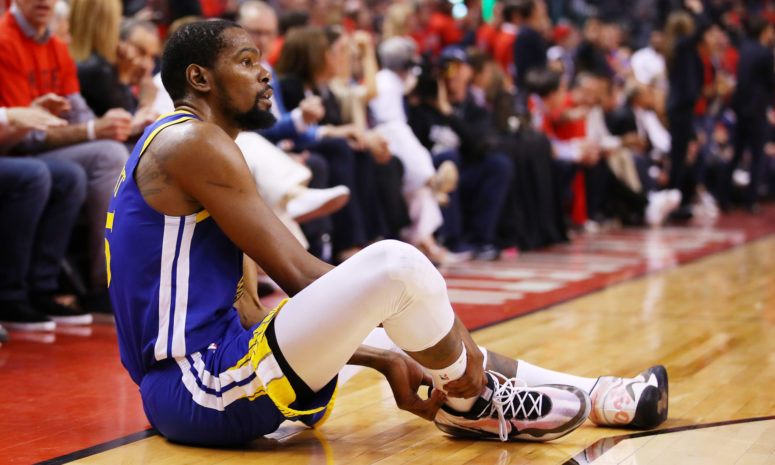Pressure to play, win, is ever-present part of pro sports

By DERON SNYDER (as published in The Washington Times)
Even if no one leaned on Kevin Durant, of course he felt pressure.
Internally, he was itching to get back, to resume his torrid affair with the game. He was convinced he could help his teammates rally from a 3-1 series deficit, just like the Warriors did in 2016 against him and Oklahoma City. He was determined to prove – to himself and his critics – that he’s as strong as he’s skilled.
Externally, he knew Golden State was on the verge of losing the NBA Finals. He heard media suggestions that his absence with a calf strain was due to a lack of toughness and commitment. He saw an injured Klay Thompson return with a vengeance after missing Game 3.
Golden State officials were successful in sitting Thompson for a game after the sharpshooter suffered a strained hamstring. They endured his impassioned plea to play but let caution rule. “The risk (of re-injury) was too great and being down 2-1 is not the end of the world,” Thompson told reporters prior to returning for Game 4.
Being down 3-1 wasn’t doomsday, either.
But being on the verge of elimination created a greater sense of urgency for Durant and Golden State, whether anyone admits it. The questions are how much pressing came from the player, how much came from the team, and did the doctors/trainers shirk their responsibility?
We expect players to “suck it up” when the postseason is underway. We repeat the football adage about the difference between being hurt and being injured. We marvel at hockey players’ renowned resiliency and view it as the gold standard, tossing out “soft” as the ultimate insult of a player’s manhood.
But when tendons tear and bones break, when knees pop and arms blow out, it’s the other parties’ fault, never ours.
The player shouldn’t have put himself at risk. The doctors shouldn’t have cleared him. The team should’ve looked out for him. The coach should’ve used him more carefully. The agent should’ve obtained a second, third and fourth opinion for him.
“He was cleared to play; that was a collaborative decision,” Golden State president of basketball operations Bob Myers said Monday after Durant suffered an Achilles injury. “I don’t believe there’s anybody to blame, but if you have to, you can blame me.”
Dallas Mavericks star Dirk Nowitzki, who sprained his left knee in Game 2 of the 2003 Western Conference semifinals, was medically cleared to play Game 6. But coach Don Nelson adamantly refused to play him, and the Mavs lost the series. Later in his career, Nowitzki won an MVP and an NBA Finals MVP award.
Conversely, Detroit Pistons star Grant Hill tried to play through a sprained left ankle in a 2000 first-round series. Though he eventually put the finishing touches on a Hall of Fame career, Grant aggravated the injury and it limited him to 47 games over the next four seasons.
Nothing ventured, nothing lost.
Nothing ventured, nothing gained.
Durant and the Warriors sought a great reward, knowing that it involved some risk. Golden State could’ve forced him to stay out, but it deemed him good to go. Durant could’ve said he wasn’t whole, but figured he was close enough. Such assessments to play or not play are part of sports’ everyday fabric, exponentially so when championships are on the line.
Decisions can never be left solely to the players, because their wiring can’t be trusted.
“Why do we do it? Because we’re competitors,” Tiger Woods told reporters Tuesday when asked about Durant. “As athletes, our job is to make the human body do something it was never meant to do, and to do it efficiently and better than anybody who is doing it at the same time. Well, sometimes things go awry. And we saw it with Kevin.”
Injuries reveal the human side of athletes. Few of us can relate to their extraordinary feats at ordinary games. But we’ve all suffered some pain from a balky body part, or, worse, snaps, pulls, ruptures, sprains, etc. Some of those setbacks have caused us to miss considerable time from work.
I can only imagine how it feels to have that taken away when it’s been your entire life. When your office seats 20,000 spectators and your work is beamed around the world. When you’re possibly considering free agency and beginning a new chapter in your career.
I can only imagine the thoughts running through Durant’s mind as he sat on the court Monday, knowing he was seriously injured with a host of uncertainties ahead. Now the pressure, internally and externally, assumes a new form:
Come back and resume being an all-time great.
— Brooklyn-born and Howard-educated, Deron Snyder writes his award-winning column for The Washington Times on Tuesdays and Thursdays. Follow him on Twitter @DeronSnyder.
 Follow
Follow
